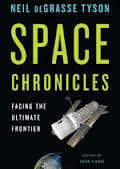Tyson, Neil DeGrasse. Space Chronicles: Facing the Ultimate Frontier. New York: W. W. Norton, 2012. Print.
First Sentences:
First Sentences:
Some people think emotionally more often than they think politically.
Some think politically more often than they think rationally. Others never think rationally about anything at all.
No judgment implied. Just an observation.
Some of the most creative leaps ever taken by the human mind are decidedly irrational, even primal. Emotive forces are what drive the greatest artistic and inventive expressions of our species. How else could the sentence "He's either a madman or a genius" be understood?
Description:
OK,
here is my caveat to judging a book by its first sentence: for books about science, more than one sentence or paragraph should be viewed before judgment is given. Maybe a whole page.
A
science book, especially one covering a personal passion (such as space travel for me), does not have to grab my attention in the first sentence: the author has it right away because I already have an interest in this topic.
However, after a couple of paragraphs, the author had
better come up with the goods to keep me going. The book must promise exciting topics, insider information, and controversial issues, all written in clear, concise, and transporting terms easily understood by a non-scientist.
Space Chronicles is composed of 2- to 6-page chapters compiled from Tyson's previous writings which provide bite-sized peeks into and explanations of the history, current status, and future of space. Topics range from "Why Explore?" "The Next Fifty Years in Space," "For the Love of Hubble," to "The Last Days of the Space Shuttle." Just this sampling of chapters made me salivate like Pavlov's dog. Having an expert provide a layman's explanation of all things space-related is just too great for me.
A great science book can grab and hold even readers who are novices or have little interest in a scientific topic like space. Consider these enticing chapters: "Happy Anniversary, Star TrekI" "Delusions of Space Enthusiasts," "Spacecrfaft Behaving Badly," "2001 -- Fact vs. Fiction," "Evil Aliens," and "Killer Asteroids." Got your attention yet?
Tyson is a brilliant mind, yet he carefully tempers his intellect in order to convey more clearly the essence of each issue for the non-scientist. He recognizes the collective interest in space, so in writing Space Chronicles, he attempts to clarify current space-related issues perplexing to ordinary space enthusiasts and anyone else who has looked up into the sky and wondered about the space shuttle, moon walk, Mars rover, or asteroids hitting Earth and wanted more information. And he succeeds magnificently.
Want to argue NASA's budget being too much when the money could be used here on earth? Tyson explains that only one half of one penny in our taxes goes to NASA. "The U.S. military spends as much in 23 days as NASA spends in a year -- and that's when were not fighting a war, " he writes, and "The U.S. bank bailout exceeded the half-century lifetime budget of NASA."
Sprinkled throughout the book are fascinating tidbits culled from his previous Twitter posts about the world of astrophysics, such as "Isaac Newton: Smartest ever. Discovered laws of motion gravity and optics. Invented calculus in spare time. Then turned 26;" and "If the Chilean miners are heroes (rather than victims) then what do you call the NASA and Chilean engineers who saved them?"
Challenging. Enlightening. Logical. Thoughtful. These words epitimize what I look for in an author and text for any science-themed (and especially space-related) book. And Tyson delivers over and over again.
If you are curious about anything space-related, from astronauts to asteroids, from aliens to science education, this is the book.
Happy reading.
Fred
www.firstsentencereader.blogspot.com
Comprehensive and engrossing history of man's ventures into space based on interviews with astronauts and NASA officials, as well as insider information gathered in recently declassified documents from the US and Soviet Union.
Smith, Andres. Moondust: In Search of the Men Who Fell to Earth.
Interviews with the surviving astronauts who walked on the moon about their recollections of their adventures, effects of the moon walks, current life choices, and future dreams. Compelling, interesting insider reading for anyone with even casual interest in the men who journeyed to the moon and the NASA program that sent them there.

No comments:
Post a Comment
Add a comment or book recommendation.